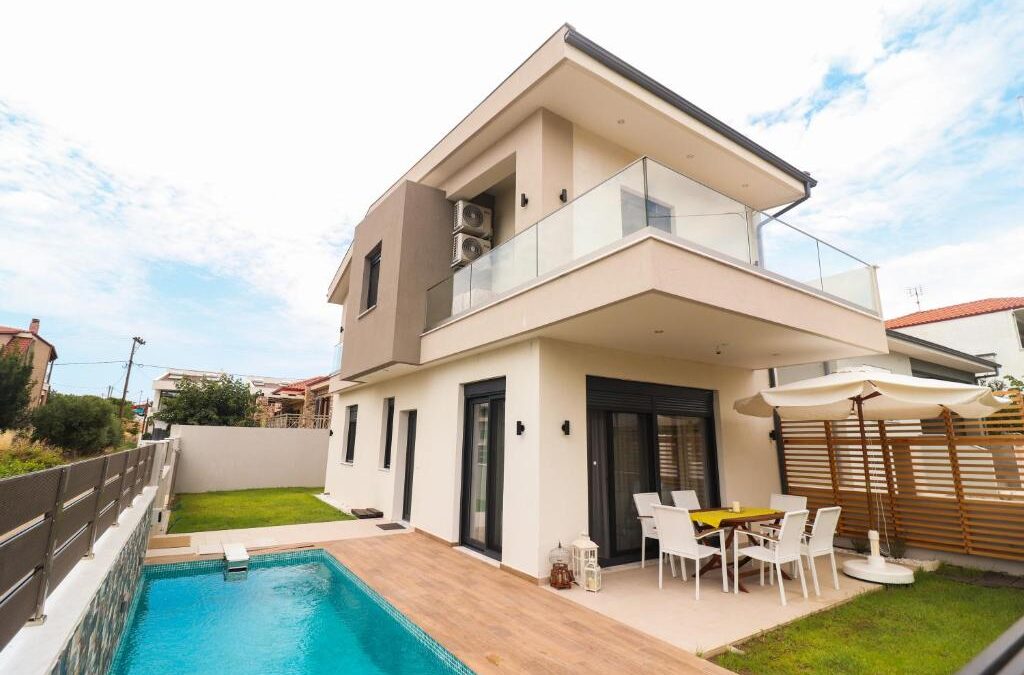The world of pool maintenance is filled with a variety of choices when it comes to sanitizers and keeping your pool sparkling clean. Among these options, one popular choice is ‘bromine’. But what is bromine in a pool, and how does it help water stay clean and safe for swimming? In this article, we’ll dive into bromine’s role in aquatic environments, uncover its benefits and uses, and help you understand why it might be the right choice for your pool.

The Role of Bromine in Pool Sanitation
In essence, bromine is a chemical element used in pool maintenance as a sanitizer, much like its more widely known counterpart, chlorine. However, bromine often attracts pool owners interested in a softer feel in the water and less irritation to the eyes and skin. Understanding its role and effectiveness are crucial for any pool owner looking to maintain high water quality.
How Bromine Works
Bromine works in a unique way compared to other sanitizers. It’s a halogen that targets and kills bacteria and other contaminants in water. What makes bromine particularly effective is its ability to continue working at higher temperatures, which is invaluable for warm pools or hot tubs. Unlike chlorine, which dissipates quickly in warm water, bromine provides a longer-lasting level of sanitation.
Bromine’s Stability
The stability of bromine is one of its defining features. It remains active even after neutralizing contaminants, maintaining sanitation for extended periods. This feature is beneficial in reducing the frequency of dosing the pool, thereby making pool maintenance easier over time.
Comparing Bromine and Chlorine
Although bromine and chlorine generally achieve similar outcomes in pool sanitation, the routes they take are quite distinct.
Differences in Reactivity
One of the significant differences between these two chemicals is their reactivity. Chlorine is known for its quicker reaction with water contaminants, but it can lead to strong chemical smells and irritation for swimmers. Whereas bromine takes a more controlled approach while still being effective against a broad spectrum of pool pollutants.
Advanced Water Technologies play a crucial role in pool maintenance, providing safer and more effective solutions.
Chlorine Compound vs. Bromine Waste
An interesting fact about bromine is how it forms bromamines when it reacts with contaminants. Unlike chloramines from using chlorine, bromamines remain active as sanitizers, keeping pool water clean longer with less maintenance hassle.
The Advantages of Using Bromine
Why do some pool owners prefer bromine over other sanitizers? Let’s explore the advantages that could sway your decision.
Bromine’s Gentler Effect
The most noticeable difference when using bromine is the gentler swimming experience. With less of the harsh odors that chlorine provides, bromine is ideal for swimmers who are sensitive to smells and irritations.
Discover how a pool adds home value
Compatibility with High Temperatures
Bromine shines in high-temperature situations, remaining stable and effective where chlorine would initially flourish but eventually fail. This feature primarily makes it suitable for spas where warm temperatures are standard.
Comprehensive Sanitation
Along with killing bacteria, viruses, and algae, bromine also acts against biofilms, providing comprehensive sanitation for your pool or spa. This means fewer risks of any growth disturbing the serene atmosphere.
Implementing Bromine in Your Pool
If the advantages mentioned above make you opt for bromine, there are some key steps and guidelines to follow for seamless implementation.
Choosing the Right Bromine Products
Bromine comes in various forms, such as tablets or granules. Often, these products are paired with additives that facilitate their dispersion in pool water. It’s vital to choose products designed specifically for your pool’s needs.
Establishing the Right Levels
For effective sanitation, keeping the correct levels of bromine in your pool is critical. Pool experts recommend levels between 3-5 parts per million (ppm), ensuring water is both clean and comfortable to swim in.
The Importance of Consistency
Pool sanitation consistency is key. Regular monitoring and adjusting of bromine levels prevent sudden swings that can inconvenience swimmers and detract from overall water quality.

FAQs About Bromine in Pools
Is bromine safe for all types of pools?
Yes, bromine is generally safe for all types of pools, but it’s particularly beneficial for indoor pools and hot tubs due to its stability at higher temperatures.
Does bromine smell like chlorine?
No, bromine has a much milder smell than chlorine, making it a great alternative for those sensitive to strong chemical odors.
How often should bromine levels be checked?
Bromine levels should be checked at least twice a week, especially if the pool gets frequent use or experiences heavy rain which can dilute sanitizers.
This article contains affiliate links. We may earn a commission at no extra cost to you.

